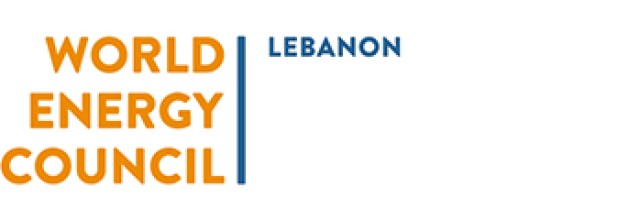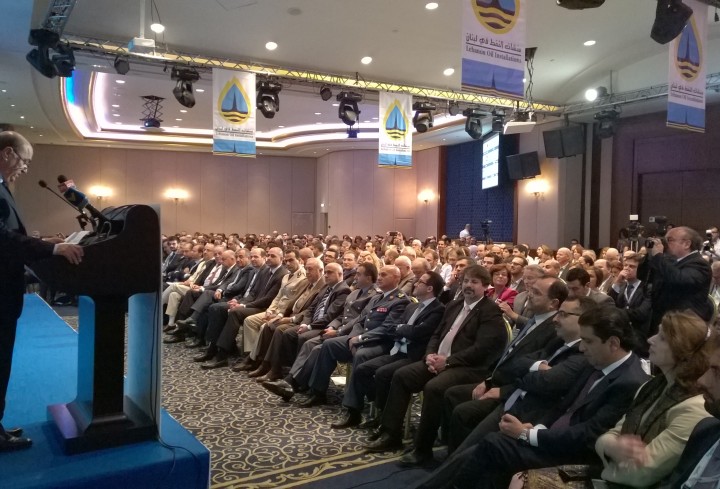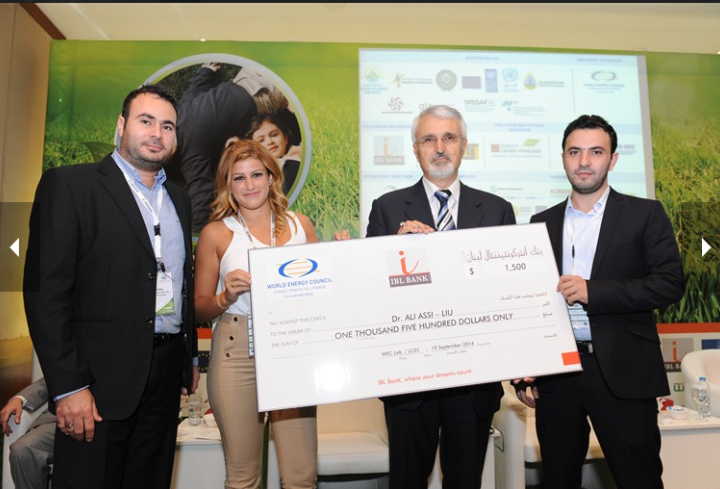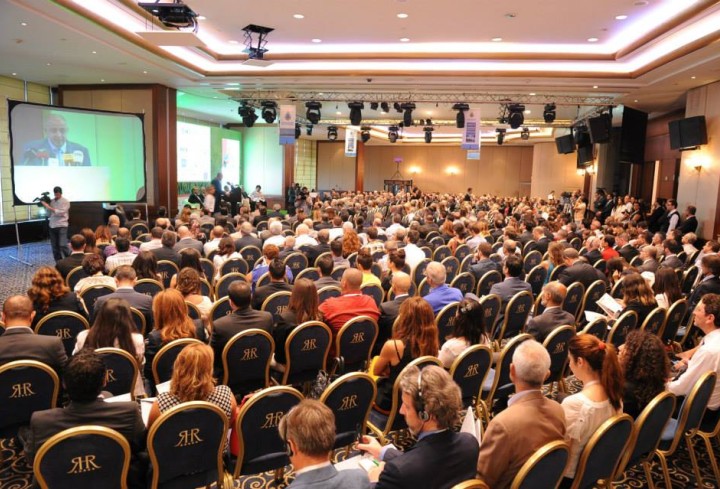The Lebanon National Committee aims to promote sustainable energy development in Lebanon, as a part of the WEC’s energy vision. As a member of the WEC network, the organisation is committed to representing the Lebanese perspective within national, regional and global energy debates. The committee includes a variety of members to ensure that the diverse energy interests of Lebanon are appropriately represented. Members of the committee are invited to attend high-level events, participate in energy-focused study groups, contribute to technical research and be a part of the global energy dialogue.
Mr. El Khoury is the General Director and President of the Board at LCEC. Graduated from the American University of Beirut (AUB), he holds a Bachelor Degree in Electrical Engineering and a Master Degree in Engineering Management. He joined UNDP in 2005 to become a member of the LCEC project team. He became the project manager of the center by end of 2008. With the institutionalization of the LCEC in 2011, he headed the first Executive Board. He was appointed in 2010 by the Ministry of Energy and Water as member of the national committee responsible for the implementation of the “Policy Paper of the Electricity Sector” for Lebanon. He is the main writer of the National Energy Efficiency Action Plan for Lebanon (NEEAP), making Lebanon the first country in the Arab world to have such a plan. El Khoury is also the main developer of the concept of NEEREA, Lebanon’s national financing mechanism. He is the national representative of Lebanon in the Board of Trustees of the Regional Center for Renewable Energy and Energy Efficiency (RCREEE). He is also Secretary of the World Energy Council (WEC) Lebanon Committee, the national focal point of IRENA, MSP, and many other initiatives.
Energy in Lebanon
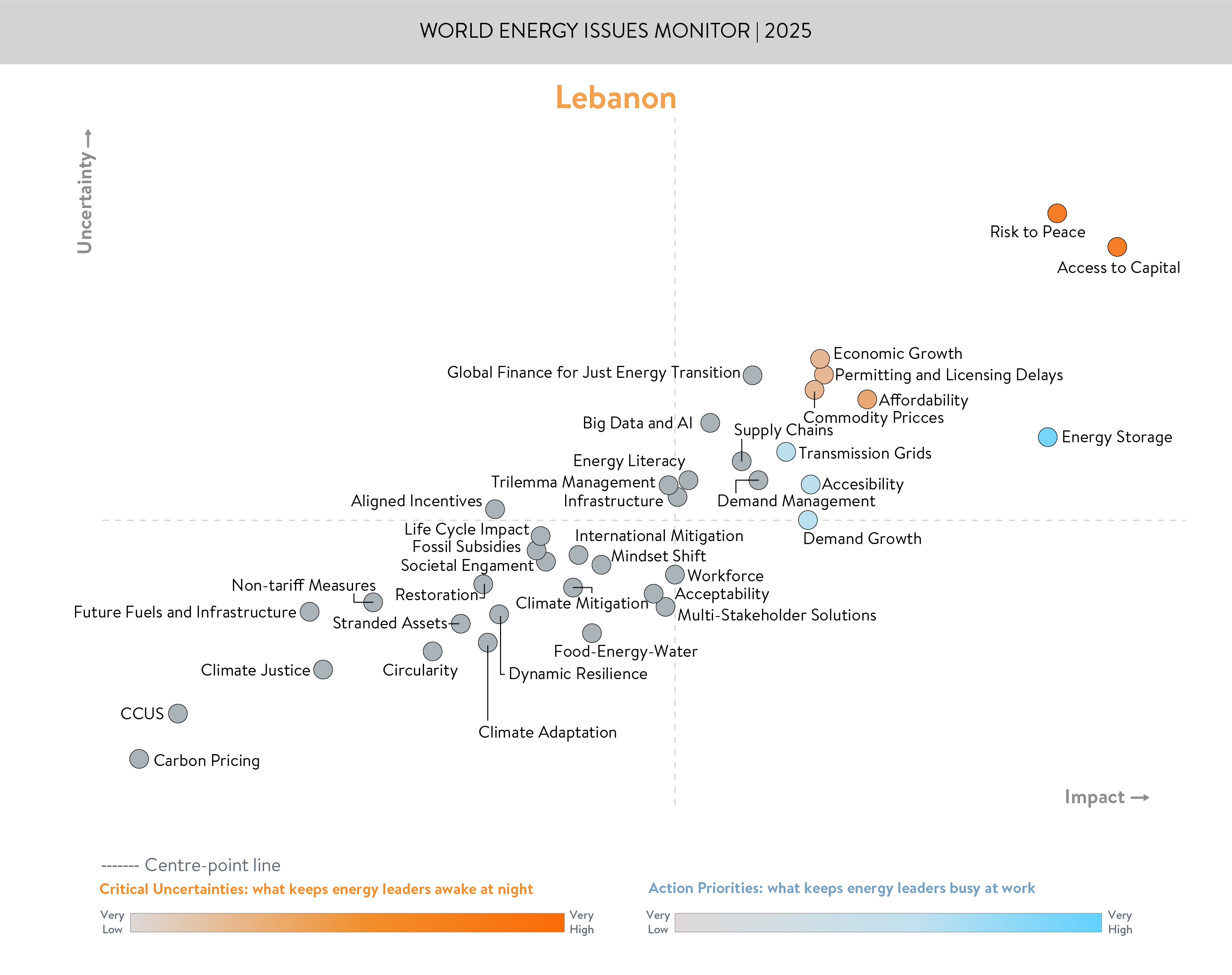
ENERGY ISSUES IN MOTION
Lebanon’s energy sector continues to face profound structural challenges, with access to capital emerging as the most critical uncertainty. The country’s prolonged macroeconomic crisis has crippled the banking system, leading to a severe credit crunch that has curtailed financing for infrastructure projects, including those in renewable energy. This financial strain, compounded by political instability and regional geopolitical tensions, has severely restricted both public and private investment. Renewable energy initiatives, in particular, face elevated financial risks within this unstable economic environment. Further complicating the situation is Lebanon’s reliance on aging, heavy-fuel power stations, poor infrastructure maintenance, and frequent disruptions in fuel imports. The absence of a clear, enforceable energy policy and a functioning regulatory framework has stalled reforms and hindered long-term sector growth. In this context, regulatory upgrades are the top priority, especially those supporting Trilemma Management: balancing energy security, equity, and environmental sustainability. These must be supported by grid rehabilitation, real-time monitoring, and inclusive solar energy initiatives.
Over the past year, Lebanon’s energy landscape has witnessed both progress and persistent challenges. A major development has been the rapid, widespread adoption of solar energy by businesses, hospitals, universities, and households responding to the unreliable public grid. This shift was reinforced by the Distributed Renewable Energy (DRE) Law, which allows users to sell excess solar power back to the grid, with the potential to add 800 MW of capacity. However, the delayed activation of the Electricity Regulatory Authority (ERA) has limited the DRE law’s full implementation, revealing deeper governance and institutional shortcomings. International fuel agreements, such as those with Iraq, have helped mitigate shortages. At the same time, energy security has seen a notable improvement: locally produced electricity has risen from just 2% to around 20%, driven largely by decentralized solar generation, marking a meaningful step toward reducing dependence on imported fuels. In light of recent geopolitical developments and the war on Lebanon, risk to peace remains a critical uncertainty, while access to capital and economic growth have emerged as new critical uncertainties. These developments are accompanied by a shift in action priorities, with accessibility and demand growth becoming more central in 2025. These evolving dynamics are reflected in Lebanon’s Energy Issues Map, which captures the contrast between growing solar adoption and enduring governance, economic, and geopolitical challenges.
FROM BLIND SPOTS TO BRIGHT SPOTS
Despite progress, several critical blind spots remain under-prioritized within Lebanon’s energy transition. The outdated transmission grid struggles to handle renewable energy, leading to power fluctuations and inefficiencies. Broader energy efficiency strategies are also lacking, with outdated appliances and poor insulation in buildings contributing to excessive consumption. A major overlooked issue is the lack of trained technicians. Without workforce development, the renewable sector cannot grow sustainably. Moreover, energy access remains deeply unequal, with wealthier communities relying on private solar or generators, while poorer areas endure unreliable power and unhealthy alternatives. Lebanon also has yet to fully explore alternative renewables such as waste-to-energy, and biomass, which could diversify its energy mix. Addressing these blind spots will require policy updates that include enforcement of building codes, incentives for energy efficiency, investments in technical education, and a comprehensive roadmap that integrates all energy sources into long-term national planning.
Nonetheless, Lebanon has achieved notable progress that offers valuable lessons for other countries, standing out as the only developing nation to have met its Nationally Determined Contributions (NDCs) for 2030. A major driver has been the rapid growth of decentralized solar energy, fueled by private sector leadership and community action. Thousands of households and businesses have adopted solar systems - often paired with battery storage - to compensate for the collapse of the public grid. Remarkably, this transition occurred with minimal government support, highlighting the strength of market-driven solutions and local initiative. The newly enacted Distributed Renewable Energy (DRE) Law has accelerated this shift by enabling private generation and peer-to-peer energy trading. Solar companies have adapted with tailored offerings, from installation to maintenance, making clean energy more accessible. These developments have reduced demand on the national utility, cut emissions, and strengthened resilience. Lebanon’s experience shows how energy transitions can thrive even in the absence of strong central governance.
ADDRESSING CRITICAL UNCERTAINTIES TO BALANCE THE WORLD ENERGY TRILEMMA
In the context of the World Energy Trilemma - energy security, energy equity, and environmental sustainability - Lebanon faces complex, interconnected challenges. Political instability and reliance on imported fuels threaten energy security, as geopolitical shifts and supply chain disruptions can severely impact electricity access. Priority actions include diversifying energy sources, modernizing the grid, and strengthening regional interconnections. Energy equity is strained by tariff reforms, the rise of informal energy markets, and limited rural access. Policies such as targeted subsidies, affordable solar financing, and rural microgrids are essential to ensure equitable access. Environmental sustainability remains weak due to widespread use of diesel generators, poor enforcement of environmental standards, and limited climate adaptation planning. To address this, Lebanon plans to accelerate renewable energy deployment, implement energy efficiency programs, and enforce stricter environmental regulations. These efforts are guided by the upcoming National Renewable Energy Action Plan (NREAP) and the National Energy Efficiency Action Plan (NEEAP 2025–2030), which together aim to chart a sustainable and resilient energy future.
Supply chains, demand management, international collaboration and the food-energy-water nexus are key issues to explore that can significantly influence Lebanon’s Energy Trilemma. Disrupted or unreliable energy supply chains, especially for fuel and solar equipment, weaken energy security and delay access to clean technologies. Improved demand management can enhance grid reliability, reduce energy waste, and lower costs, promoting both equity and sustainability. International collaboration offers access to funding, technology transfer, and best practices, helping Lebanon overcome its infrastructure and governance challenges while accelerating the clean energy transition. The food-energy-water nexus highlights the interdependence of critical sectors, showing how inefficient energy systems increase strain on water and agriculture, especially under climate stress. Together, these tools and frameworks can help Lebanon build a more resilient, inclusive, and sustainable energy future.
Acknowledgments
Lebanon Member Committee
Downloads
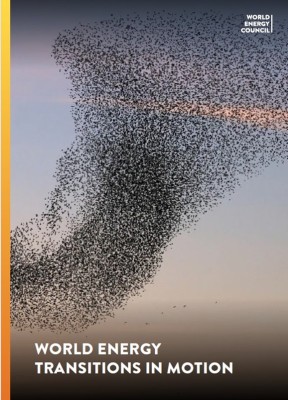
Lebanon Energy Issues Monitor 2024 Commentary
Download PDF
World Energy Issues Monitor 2025 Full report
Download PDF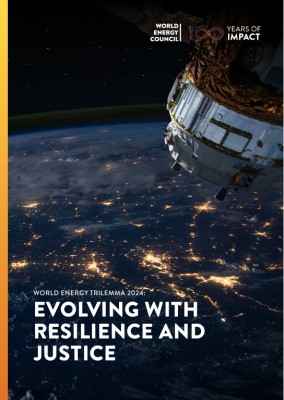
Lebanon World Energy Trilemma Country Profile 2024
Download PDF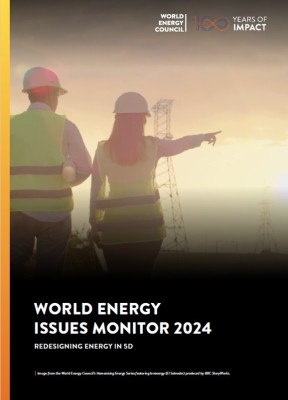
Lebanon Energy Issues Monitor 2024
Download PDF
World Energy Issues Monitor 2024
Download PDF


